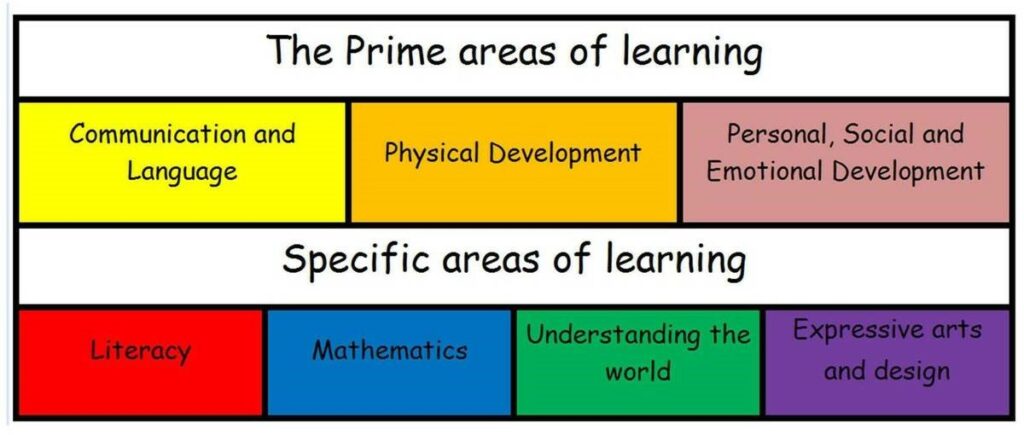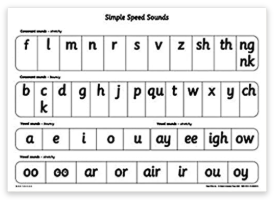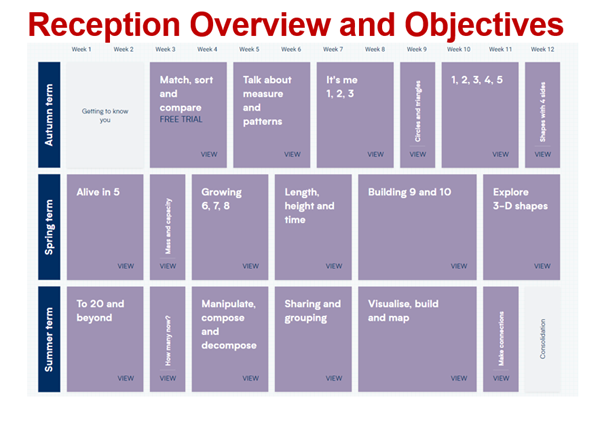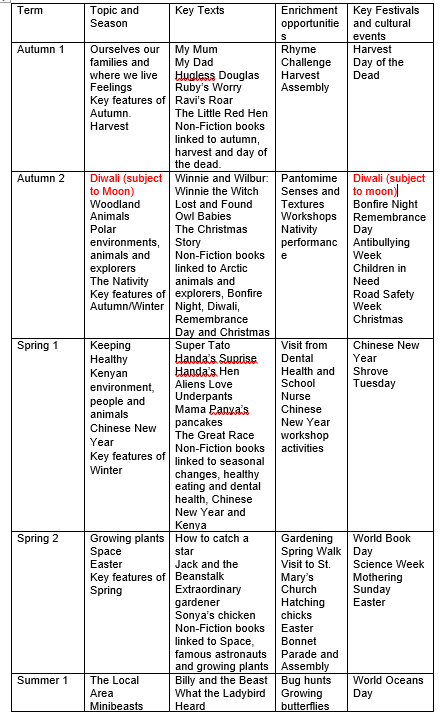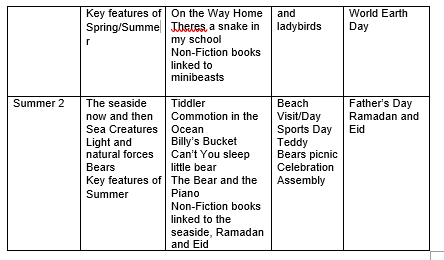Reception
Early Years Curriculum Statement – Nursery and Reception
In the Early Years department at Forest Gate Academy, we aim to provide a happy, secure and stimulating environment with opportunities for children to learn and develop positive relationships with their peers and familiar adults. We aim to work closely with parents and carers and create an effective home school partnership.
Nursery and Reception are part of the Early Years Foundation Stage. The Early Years Foundation Stage sets standards for the learning, development and care of children from birth to 5 years old and its framework supports an integrated approach to early learning and care.
It is our Intent at Forest Gate Academy that ‘Our EYFS setting offers the children a broad and ambitious curriculum that enables children to become confident and enthusiastic learners. This curriculum builds on what children know and can do to ensure they have the skills and knowledge for their future learning.’
In Implementing our broad and balanced curriculum which promotes the key features of retention and progression, both Nursery and Reception cover similar suggested themes and topics. This enables us to work more effectively as an Early Years unit with regard to sharing resources, ideas, planning and enrichment opportunities and providing consistent experiences and expectations for the children. We use White Rose Maths, NCETM Mastering Number and the Read Write Inc schemes of work alongside The Dean Trust EYFS curriculum to ensure the progression of children’s knowledge, understanding and key skills across the Early Years.
In the Early Years at Forest Gate Academy, we use Bromcom alongside Tapestry as our online assessment/tracking systems. They allow us to capture key moments of children’s learning and development, and assists us in planning experiences and activities for children. They also help us to oversee children’s progress and development throughout their time in the Early Years and allows us to share key pieces of evidence and reports with parents relating to their child’s development.
In the Early Years, children will take part in a mixture of whole class activities, group activities and individual activities. Both the Nursery and Reception environments are organised into key learning areas such as writing, reading, creative, construction, role play, maths and sand and water. These areas are fully equipped and enhanced to engage, stimulate and extend the children’s development and learning. The children also have access to a well-resourced outdoor area which supports and builds upon the experiences that they receive inside.
The Early Years curriculum is split into 7 areas of learning. There are 3 prime areas of learning – Communication and Language Development; Personal, Social and Emotional Development; and Physical Development and 4 specific areas of learning – Literacy; Maths; Knowledge of the World; and Expressive Arts and Design.
Within each of the 7 areas there are progressive statements of learning which all lead into final statements called the Early Learning Goals. It is the expectation that the majority of children will have achieved these goals by the end of Reception.
Our Dean Trust curriculum incorporates all 7 areas of learning. Key progressive ‘I can’ objectives are taught each term in all of these 7 areas. These are taught through a range of themes linked largely to our key texts, the seasons and festivals.
Children are taught through a combination of adult-led and child-initiated activities. Adult-led carpet sessions are complimented by continuous provision and related enhancements to maximise engagement and learning and for the children.
Communication and Language
In communication and language in Reception we focus on developing children’s speaking and listening skills by providing a language rich environment, developing children’s confidence and skills in expressing themselves and providing opportunities for the children to speak and listen in a range of situations.
We do this by providing a range of stimulating activities closely linked to class themes and children’s interests. These include:
- Reading books every day and talking about stories, characters and illustrations
- Systematic teaching of new vocabulary linked to stories
- Circle times
- Singing songs and rhymes
- To explore and create their own stories
- Role play
- Using puppets and small world characters
- Open ended enhancements to allow children to explore and share their own narratives and ideas.
- Modelling and extending language in areas of continuous provision
- Offering real life/hands on experiences in the inside and outside areas
- Using technology such as walkie talkies, iPads and microphones
- Where needed we also run language interventions such as Nuffield Early Language Intervention, PACT (Parents and Children Together) and Talk Boost alongside bespoke small group and 1-1 interventions where needed.
Physical Development
Within the EYFS physical activity is vital in children’s all-round development and well-being. Children are given daily opportunities to develop their gross and fine motor skills both indoors and outdoors. Through PE lessons and use of the outdoor area adults support children to develop their core strength, stability, balance, spatial awareness, coordination and agility. Fine motor control is developed by providing repeated and varied opportunities to explore and play with small world activities, puzzles, art and crafts and the use of small tools. Children regularly engage in mark-making and handwriting activities.
PSED
We strive to support the holistic development of all children. In the early years, we work hard to develop children’s confidence and social skills by supporting and modelling peer interactions. Children’s emotional regulation is developed through stories, adult supported co-regulation, focused circle times, 1-1 interactions and continuous provision enhancements. Fair and consistent
boundaries through our school rules, rainbow reward system and circle times support children to regulate their behaviour and negotiate with peers. Frequent activities and discussion around personal hygiene and healthy lifestyle habitats support children to become increasingly independent in self-care and make healthy food choices.
Literacy – Reading
Reception reading sessions centre on developing their listening, language and communication skills alongside nurturing their passion for reading and sharing books and stories.
Our main learning aims within Reception Reading are:
- To develop children’s passion for reading.
- To develop their phonic knowledge.
- To develop children’s comprehension skills.
- To develop children’s listening and attention skills.
- To develop children’s communication and language fluency.
- To develop children’s knowledge of story structures and language.
- To further extend children’s vocabulary.
- To care for and respect books.
- To develop children’s imaginations.
- To become confident to share their ideas and opinions.
- To develop children’s knowledge and understanding of the wider world.
We aim to achieve these learning goals using a range of fun and engaging approaches and activities during literacy carpet sessions including ‘Talk through Stories’ and also through class themes and literacy linked continuous provision enhancements.
Phonics
We focus on developing the children’s phonics skills using the Read Write Inc scheme. In phonics they learn the English alphabetical code by first learning one way to read the 40+ sounds and blend these sounds into words. Lively phonic books are closely matched to their increasing knowledge of phonics and tricky ‘red words’. The children take part in comprehension sessions to enable them to answer questions about what they have read.
Writing
In writing the children learn to apply their phonics knowledge to sound out and spell unknown words. They develop their spelling of tricky ‘red words’. The children learn to form letters correctly and work towards writing sentences using capital letters and full stops. Children’s composition is developed by linking writing activities to their phonic reading books as well as to class stories and their own experiences.
Mathematics
It is our aim to create confident mathematicians who have a lifelong love of maths. We focus on developing children’s fluency of number and reasoning skills as well as other mathematical areas including shape, space and measure.
Children take part in daily maths sessions and are given opportunities to practice these skills in continuous provision.
In Reception we follow the White Rose and Mastering Number schemes of work as a guide to teach maths in a systematic and progressive manner.
The children cover the following units across the year:
Understanding the World
We provide a wide range of personal experiences to increase children’s knowledge and sense of the world around them. Stories, workshops, cultural visits and visitors from the local community enrich children’s understanding of different people, places and communities. Classroom enhancements and discussions are used to develop children’s understanding of the technologically, socially, culturally and ecologically diverse world and widen their vocabulary.
Expressive Art and Design
Children are actively encouraged to explore and engage with a broad range of art and design materials, music, dance and songs to support their imagination, creativity and expression. Children are supported to explore their own ideas and develop their skills and confidence in the arts.
